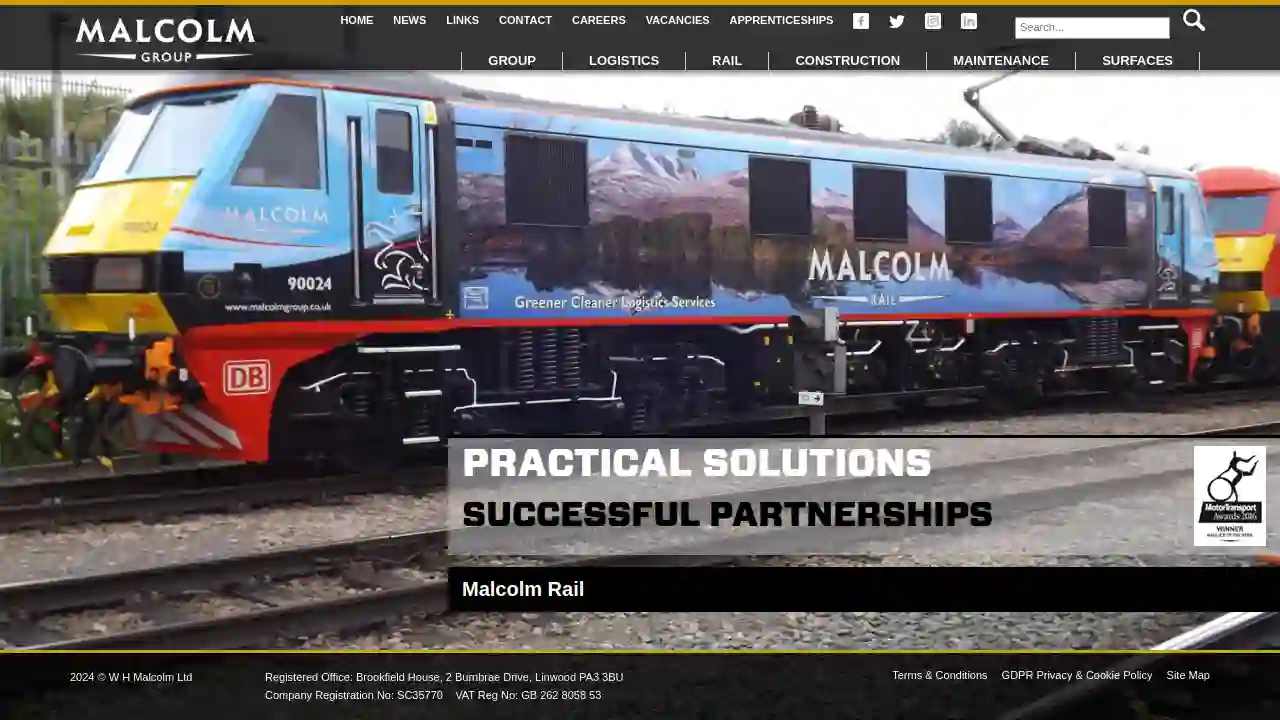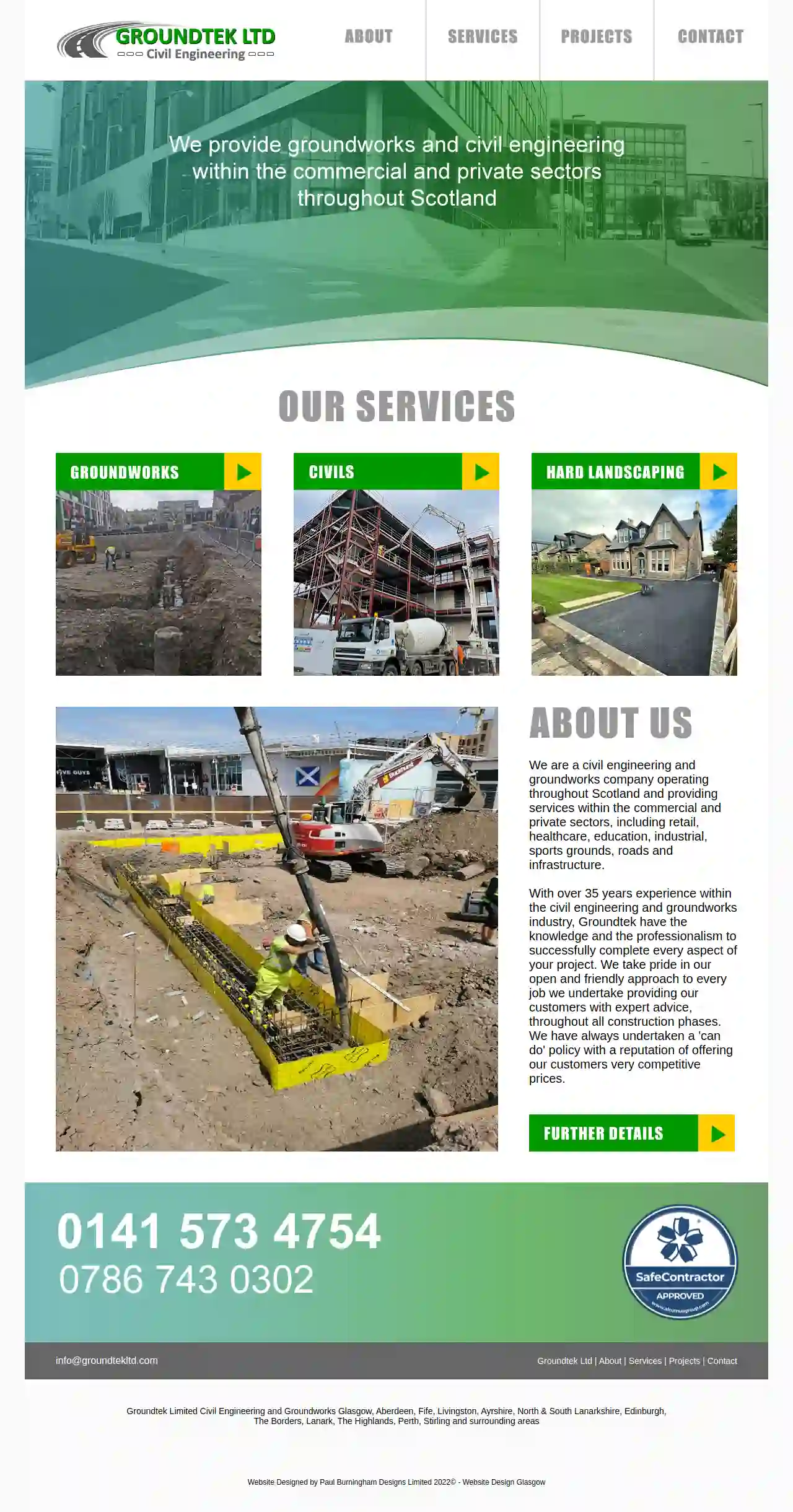Excavation Contractors Bonnybridge
Top Land Excavation in Bonnybridge
Receive up to 3 Excavation Company Near Me quotes for your project today! Compare profiles, reviews, accreditations, portfolio, etc... and choose the best service.

R Tough Plant Hire
51 reviewsCroftfoot Farm, Tupps Road, Croftfoot Farm Tupps Road Carluke Lanarkshire, Carluke, ML8 4QX, GBR Tough Plant Hire Ltd: Your Trusted Partner for Construction Projects in Central Scotland R Tough Plant Hire Ltd is a well-established company with over 15 years of experience in plant hire and construction services. We offer a comprehensive range of services, including specialist plant hire, groundwork construction, and demolition operations. Whether you're a homeowner tackling a DIY project or a large construction company undertaking a major development, we have the expertise and resources to meet your needs. We understand that construction projects can be complex, and we're here to make the process as smooth and stress-free as possible. Our team of experienced professionals will work closely with you to understand your requirements and provide tailored solutions. We pride ourselves on our commitment to quality, safety, and customer satisfaction. Our plant hire services include both self-drive and operated machinery. If you have the experience and relevant qualifications, you can choose from our wide selection of JCBs, excavators, and tractors. Alternatively, we have CPCS and PTS qualified operators available to operate the machinery for you. We are based in central Scotland and are happy to travel throughout the UK. In addition to plant hire, we also offer a full range of groundwork construction services, including drainage, foundations, concrete works, and road crossings. Our demolition services are fully insured and we are experienced in a variety of demolition projects. We can also provide recycled aggregates as a cost-effective alternative to quarry products. At R Tough Plant Hire Ltd, we are committed to providing our clients with the highest level of service. We are always happy to answer your questions and provide expert advice. Contact us today to discuss your project and get a free quote.
- Services
- Why Us?
- Gallery
Get Quote
Malcolm Construction
441 reviewsBrookfield House, 2 Burnbrae Drive, Linwood, PA3 3BU, GBThe Malcolm Group The Malcolm Group is a leading provider of practical solutions to businesses throughout the UK. We offer a wide range of services, including logistics, rail, construction, maintenance, and surfaces. We are committed to providing our customers with the highest quality of service and value for money. Our History The Malcolm Group has a long and proud history, dating back to 1934. We have grown from a small family business into a major player in the UK economy. We are committed to investing in our people and our infrastructure to ensure that we can continue to provide our customers with the best possible service. Our Values Our values are at the heart of everything we do. We are committed to: Providing our customers with the highest quality of service Investing in our people and our infrastructure Being a responsible and sustainable business Building strong relationships with our customers and suppliers
- Services
- Why Us?
- Gallery
Get Quote
Lindsay Construction (Scotland) Ltd
53 reviews65 Pitfairn Road, FishcrossAlloaClackmannanshire, 65 Pitfairn RoadFishcrossAlloaClackmannanshire, Alloa, FK10 3HU, GBAbout us and our services: Lindsay Construction was a NHBC Registered Building Contractor, however due to Covid 19 we decided not to renew our membership as we didn't anticipate building any new builds in 2021/22, however if you do wish us to quote to provide new build services, we can easily renew our membership to accommodate this. We cover Falkirk, Stirling, Stirlingshire, Alloa, Clackmannanshire, Fife and surrounding areas. All work carried out is fully guaranteed. We provide free advice and quotations. Established in 1993 we have been providing professional building services and have an enviable reputation for quality workmanship. Our concept is simple we supply high quality goods and services at low prices. It is obviously a winning combination as over the years we have built up a vast network of satisfied customers, which keep coming back, and also recommending us to friends and family, proving we are a company you can trust. Working closely with our clients throughout the project ensuring all expectations are met, our skilled team of craftsmen are courteous and ready to help realise your dreams. In short we deliver a quality, value for money, knowledgeable and expert service, attention to detail being our winning formula in this competitive market. We specialise in New Builds, Self builds for clients, House Extensions, Renovations and Modernisations, Loft and Garage Conversions, Property Maintenance and Repairs and Home improvements. We offer a wide range of kitchen and bathroom supply and fitting services, to provide our customers with a fully customised service. We also offer Mono bloc driveways and slabbing services, please see our gallery section for ideas. Our customers enjoy the benefits of our discounted Trade accounts with Local Businesses to name a few examples, Beatsons Building Supplies, Alloa Hire, Hamilton and Brydie, and Multi National Organisations, Jewsons, Magnet, Howdens, Plumbworld and much more, our savings are passed on. Please see our useful links page for more information. We are also registered as a VIP Velux installer partner.
- Services
- Why Us?
- Our Team
- Gallery
Get Quote
Blocked Drain Glasgow
549 reviews2nd Floor, Clyde Offices, 48 West George Street, Glasgow., Glasgow, G2 1BP, GBBlocked Drain Glasgow: Your Trusted Drainage Experts in Glasgow Blocked Drain Glasgow is a well-established drainage company based in Glasgow, offering a comprehensive range of services to both domestic and commercial clients. We are committed to providing quick, efficient, and reliable solutions for all your drainage needs. Our team of experienced and highly trained drainage engineers are equipped with the latest high-pressure jetting equipment to tackle even the toughest blockages. We specialize in: • Unblocking drains • Drain clearance • CCTV camera work • Sewerage clearance • Septic tank emptying • Drain testing and installation • Drain repairs and maintenance • Drain excavation • Drainage consultancy • General plumbing work We understand that drainage problems can be stressful and disruptive, which is why we offer a 24-hour emergency callout service. We are here to help you around the clock, ensuring your peace of mind. At Blocked Drain Glasgow, we pride ourselves on our commitment to quality and customer satisfaction. All our work is guaranteed, and we are dedicated to providing a professional and friendly service. Contact us today to discuss your drainage requirements and receive a free, no-obligation quote.
- Services
- Why Us?
- Testimonials
- Gallery
Get Quote
Groundtek Ltd
51 reviewsMount Vernon, Glasgow, GBGroundtek: Your Trusted Civil Engineering and Groundworks Partner in Scotland Groundtek is a well-established civil engineering and groundworks company with over 35 years of experience serving both commercial and private sectors across Scotland. We've built a strong reputation for delivering high-quality, cost-effective solutions for a wide range of projects, from large-scale infrastructure to smaller domestic works. Our team of skilled professionals is committed to providing expert advice and exceptional service throughout every stage of your project. We take pride in our open and friendly approach, ensuring your needs are met with a 'can-do' attitude and competitive pricing. Whether you're looking for civil engineering services for a new retail development, healthcare facility, educational institution, industrial site, sports ground, road construction, or infrastructure project, or require groundworks for your home, Groundtek has the expertise and experience to deliver. We've successfully completed numerous projects across Scotland, including complex foundations, drainage, service ducts, and composite concrete floors for Boroughmuir High School in Edinburgh, as well as car parks, shopping centers, retail parks, driveways, patios, and garden walls. Our commitment to health and safety is unwavering. We adhere to all approved codes of practice and current legislation, ensuring our management staff and operatives are fully trained to the highest standards. We are accredited and approved by Safecontractor, demonstrating our dedication to safety and quality. Contact Groundtek today to discuss your project requirements and experience the difference our expertise and dedication can make.
- Services
- Why Us?
- Accreditations
- Gallery
Get Quote
EBS Construction
3.89 reviews10 Loanbank Quadrant, Glasgow, G51 3HZ, GBEBS Construction: Your Trusted Partner for Property Maintenance and Restoration in Glasgow EBS Construction is a leading provider of property maintenance and restoration services in Glasgow. We are experts in all aspects of building restoration, including lime mortar, lead work, slate work, and specialist masonry. Our team of fully trained and highly skilled professionals across all trades ensures that we deliver a high-quality and fully comprehensive service. Our Commitment to Excellence At EBS Construction, we are committed to providing our clients with the highest quality workmanship and customer service. We subscribe to Construction Line, the UK register of Pre-Qualified Construction Services, giving our clients the assurance of our expertise and reliability. Our Services We offer a wide range of services, including: Project Management Conservation and Restoration work Specialist Masonry Re-pointing; lime mortar Structural repairs Roof repairs Complete internal and external decoration Domestic large and small Lead work Slate work Timber rot eradication Our Approach We are dedicated to delivering cost-effective and time-efficient solutions without compromising on quality. We utilize the latest industry technology from the initial planning stages to accurately plan and forecast projects. Our Directors and team of professional tradesmen work diligently to ensure that your project is completed to the highest standards, on schedule, and within budget. Why Choose EBS Construction? We are a trusted and experienced team with a proven track record of delivering exceptional results. We are committed to providing our clients with a seamless and stress-free experience. Contact us today for a free, no-obligation quote and let us help you bring your project to life.
- Services
- Why Us?
- Gallery
Get Quote
ECOTECH
Office 1 Cameron House 17 Glasgow Road, Hardgate, Clydebank, Scotland, G81 5PJ, GBRENEWABLE ENERGY IN SCOTLAND Contact our electricians at Ecotech Contracts Ltd. We serve Glasgow and across the UK and Republic of Ireland. OVER 50 YEARS' EXPERIENCE Ecotech Contracts Ltd is a Scotland based solar energy company dealing with commercial clients across Scotland. With the cost of energy rising at an unimaginable pace, it is the aim of Ecotech Contracts Ltd to help large businesses take control of these cost increases using the huge potential for energy generation found within solar technology. SOLAR FOR THE HOME At Ecotech Contracts Ltd in West Dunbartonshire, we can help you towards making major savings on your energy bills by installing solar panels for your home. Excess energy can either be stored by you or sold to the grid. WIND TURBINES Our highly skilled team has installed over 10 wind and solar farms across the UK. A wind turbine can produce an enormous amount of green energy for your business and is a fantastic signpost that your business is committed to sustainability. EV CHARGING With the rising cost of petrol, and more investment in the EV industry, it’s no wonder that EVs are becoming increasingly popular. Charging an EV can take as little as 30 minutes. DOMESTIC RETROFIT WORK We provide whole house retrofit assessments, to assess all required energy efficiency measures to ensure properties are progressing towards the 2050 net zero target in line with PAS 2035 standards. COMMERCIAL SOLAR Solar panels can be an excellent return on investment and increase your eco-credentials, and they can recoup their installation costs in a few years. How ecologically friendly your business is will increasingly influence potential customers. BATTERY STORAGE It is possible to sell any excess energy to the grid, however more and more people are opting to invest in battery storage so they can use all the energy they produce. ELECTRICAL CONTRACTING We have many years’ experience across all sectors of industry. For all kinds of domestic, industrial, and commercial electrical projects we exceed expectations and provide an excellent service. Our Project Managers will ensure the work is completed safely and efficiently. PPA Ecotech Contracts Ltd are a developer and work in partnership with an investor in renewable energy projects across many markets including the UK. As part of this, we offer a range of energy supply options, which have the potential to reduce customers' energy costs whilst offering 100% renewable energy supply.
- Services
- Why Us?
- Our Team
- Gallery
Get Quote
Drain Fix Solutions
4.961 reviewsGlasgow, GBAbout Us We are a locally owned business covering Glasgow and the West with over 8 years experience in the drainage industry. All our staff are fully trained and qualified so you know you are in the best hands when it comes to your drainage issues. We have probably dealt with every drainage problem imaginable so there’s not an issue too small or big. Our phone lines are operational 24/7 so you can call us anytime to book in your appointment. We specialise in all aspects of Domestic and Commercial Drainage issues and aim to carry out the works as quickly and efficiently as possible meaning less disruption for our customers. We offer a mix of fixed pricing and job rates for our services and all works are explained to you prior to commencement to ensure you are aware of what the job entails and the cost before starting. Please click on one of our services to find out more.
- Services
- Why Us?
- Testimonials
- Gallery
Get Quote
Enviro-Clean Ltd | Drainage Maintenance and Cleaning | Septic Tank Services
4.759 reviewsGlasgow, GBEnviro-Clean Scotland: Your Trusted Partner for Industrial Drainage & Waste Management Enviro-Clean Scotland is a UK-wide company specializing in industrial drainage and waste management. We offer a comprehensive range of services to meet the needs of our clients, from sewer and drain cleaning to high-pressure water jetting and vacuum excavation. We are committed to providing our clients with the highest quality services, delivered with a focus on safety, efficiency, and environmental responsibility. Our Mission Our mission is to provide our clients with the highest quality industrial drainage and waste management services, delivered with a focus on safety, efficiency, and environmental responsibility. We are committed to exceeding our clients' expectations and building long-term relationships based on trust and mutual respect. Our Values At Enviro-Clean Scotland, we are guided by the following values: Safety First Customer Focus Environmental Responsibility Integrity Teamwork Our Experience Our team has extensive experience in the industrial drainage and waste management industry. We are equipped to handle a wide range of projects, from small-scale repairs to large-scale construction projects. We are committed to providing our clients with the highest quality services, delivered with a focus on safety, efficiency, and environmental responsibility.
- Services
- Why Us?
- Gallery
Get Quote
Star Asbestos Survey Coatbridge
51 reviews34 Main St, Coatbridge, ML5 3BU, GBWELCOME TO ASBESTOS SPECIALIST OF THE UK A Company You Can Rely On At Affordable Rates! We are a Licenced Health & Safety Nationwide with offices in Coatbridge, St. Helensshire, London, Scotland, Wales and the Midlands.Your one-stop destination for safe asbestos removal and disposal in UK. We provide a comprehensive range of asbestos removal services in UK for domestic, industrial and commercial properties.If you need a Survey or advice relating to your asbestos-related problems, we can provide you with packages that are customised to cater to your specific requirements. We apply the most effective and current techniques for removing asbestos quickly and safely.Detailed method statements are designed to make sure that best practices are implemented at all times and they are compliant with UKs rules and regulations. Read More
- Services
- Why Us?
- Testimonials
- Gallery
Get Quote
Over 13,059+ Excavation Businesses on our platform
Our excavation experts operate in Bonnybridge and beyond!
ExcavationHQ has curated and vetted Top Excavation Contractors in and around Bonnybridge. Find a reliable business today.
Frequently Asked Questions About Excavation Contractors
- Topsoil Removal: Stripping the fertile topsoil layer from a site, often preserving it for landscaping.
- Trench Excavation: Digging long, narrow trenches for utilities (pipes, cables) or foundations.
- Basement Excavation: Removing earth to create a space for a basement beneath a structure.
- Pool Excavation: Digging a precise hole for installing a swimming pool.
- Roadway Excavation: Removing earth and preparing the ground for road construction.
- Demolition Excavation: Clearing debris and preparing the site after demolition.
- Channel Excavation: Creating channels for drainage or irrigation.
- Utility Locates: Contact your utility companies to mark the locations of underground lines before excavation begins. This is usually a free service.
- Hand Digging: Excavate carefully by hand near marked utility lines to avoid damage.
- Potholing: Digging small test holes to expose and verify utility depths and locations.
- Safe Distances: Maintaining a safe distance between excavation equipment and marked utility lines.
- Vacuum Excavation: Using vacuum excavation techniques to expose utilities without digging, reducing the risk of damage.
- Soil Type and Stability: Stable, cohesive soils allow for deeper excavations than loose or unstable soils.
- Groundwater Level: Excavations below the water table require dewatering techniques to manage water intrusion.
- Equipment and Resources: The size and capabilities of excavation equipment influence the achievable depth.
- Safety Regulations: OSHA and other safety regulations impose limitations on trench depths without proper shoring or sloping.
- Project Requirements: The purpose of the excavation (basement, pool, foundation) determines the necessary depth.
What is the difference between topsoil and subsoil?
Topsoil: The uppermost layer, typically rich in organic matter, nutrients, and microorganisms. It's essential for plant growth and is often darker in color.
Subsoil: The layer beneath the topsoil, containing less organic matter and generally denser. It provides support for roots but is less fertile than topsoil.
During excavation, topsoil is often removed and preserved separately for later use in landscaping, while subsoil is typically used for backfilling or other less demanding applications.
What are the different types of excavation?
How do you protect utilities during excavation?
How deep can you excavate?
What is the difference between topsoil and subsoil?
Topsoil: The uppermost layer, typically rich in organic matter, nutrients, and microorganisms. It's essential for plant growth and is often darker in color.
Subsoil: The layer beneath the topsoil, containing less organic matter and generally denser. It provides support for roots but is less fertile than topsoil.
During excavation, topsoil is often removed and preserved separately for later use in landscaping, while subsoil is typically used for backfilling or other less demanding applications.
What are the different types of excavation?
- Topsoil Removal: Stripping the fertile topsoil layer from a site, often preserving it for landscaping.
- Trench Excavation: Digging long, narrow trenches for utilities (pipes, cables) or foundations.
- Basement Excavation: Removing earth to create a space for a basement beneath a structure.
- Pool Excavation: Digging a precise hole for installing a swimming pool.
- Roadway Excavation: Removing earth and preparing the ground for road construction.
- Demolition Excavation: Clearing debris and preparing the site after demolition.
- Channel Excavation: Creating channels for drainage or irrigation.
How do you protect utilities during excavation?
- Utility Locates: Contact your utility companies to mark the locations of underground lines before excavation begins. This is usually a free service.
- Hand Digging: Excavate carefully by hand near marked utility lines to avoid damage.
- Potholing: Digging small test holes to expose and verify utility depths and locations.
- Safe Distances: Maintaining a safe distance between excavation equipment and marked utility lines.
- Vacuum Excavation: Using vacuum excavation techniques to expose utilities without digging, reducing the risk of damage.
How deep can you excavate?
- Soil Type and Stability: Stable, cohesive soils allow for deeper excavations than loose or unstable soils.
- Groundwater Level: Excavations below the water table require dewatering techniques to manage water intrusion.
- Equipment and Resources: The size and capabilities of excavation equipment influence the achievable depth.
- Safety Regulations: OSHA and other safety regulations impose limitations on trench depths without proper shoring or sloping.
- Project Requirements: The purpose of the excavation (basement, pool, foundation) determines the necessary depth.